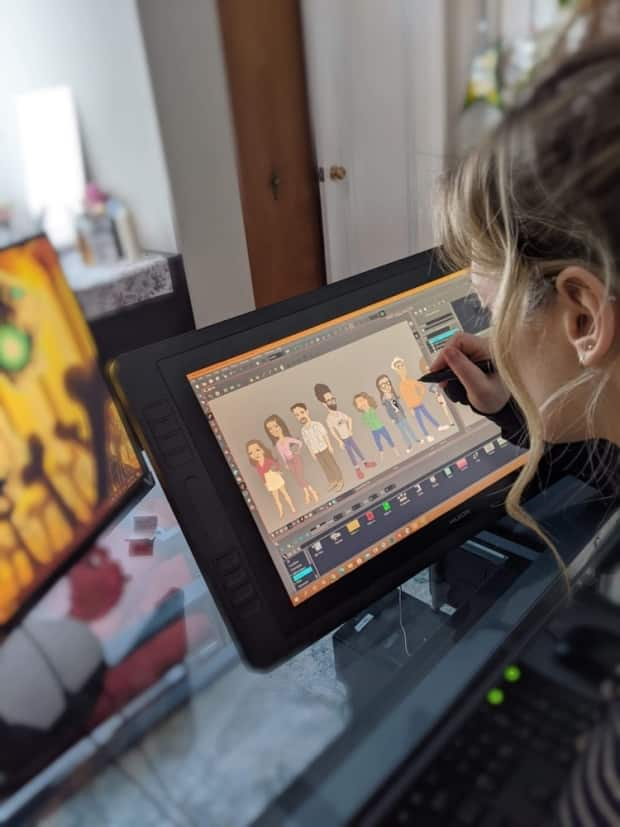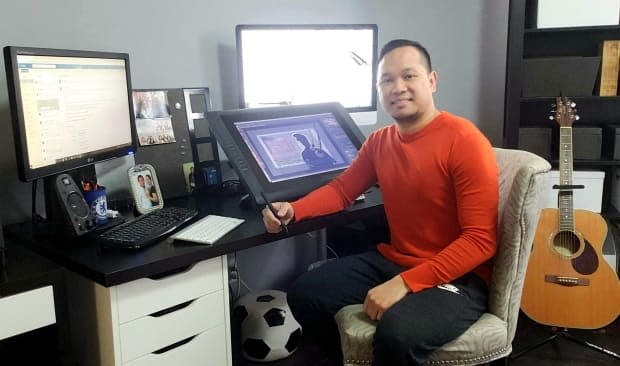Local animation studios drawing on adaptability during pandemic

(Big Jump Entertainment - image credit)
At a time when new TV shows are among the few things people have to look forward to, Ottawa animators and the studios they work for have been busier than ever bringing those stories to life.
Three Ottawa animation studios that produce shows and movies for major streaming services and broadcasters including CBC say the past year has seen virtually no slowdown in their industry.
Some had already begun adapting to working from home to collaborate with other studios in other countries, and work around snow days in the nation's capital.
In the case of Big Jump Entertainment, they stepped in to create animated episodes for two live-action sitcoms, One Day at a Time and black-ish, when lockdowns shuttered sets.
I don't think we missed a beat. I don't think the animation industry took a hit in any way. - Kyle Mac Dougall, Jam Filled
That process — going from character design to final animation on a prime-time show — usually takes 24 to 36 weeks, but they got it done in eight, according to executive director Jennifer Griffiths.
"I'd say we did it in about a quarter of the time, which is unheard of in our industry," she said.
"For One Day at a Time, they sent iPhones ... to all the actors across L.A., and they recorded from home and they shipped the audio up here, and we were very fortunate to work on that."
Griffiths said it kept artists working in Ottawa while sound stages were adapted to new COVID-19 protocols to keep casts and crews safe.

Insatiable need for content
There are rows of empty workstations at Atomic Cartoons in Hintonburg, though the studio is actually busier than ever.
About a year ago, just as the pandemic hit, animators were putting the final touches on The Last Kids on Earth, a Netflix series about kids surviving a zombie apocalypse that went on to win a Daytime Emmy a few months later.
"It wasn't lost on us the irony of that as we were working on that show, and every day we had no idea what was going to happen the next day," said studio manager Chris Wightman.
The studio added another 50 staff this year, on track with its annual growth plans since the Vancouver-based studio expanded to Ottawa in 2018, with Wightman as its lone employee.
"The pandemic has really just almost accelerated that because of the need for content," he said. "We're busier than we've ever been. We've got more projects either [with] signed contracts and green-lit, ready to go or in development, than we've ever had."
Staying connected key
Jam Filled, which was founded in Manotick in 2007 and has expanded to studios in Toronto and Halifax, has hired 270 employees during the pandemic, more than 50 of them locally.
Kyle Mac Dougall, the studio's president, said while switching to work-from-home was a challenge, it also saved them from having to move into new space in Toronto or Ottawa.
"If we actually had to go back to the office ... the space wouldn't accommodate all the people that we have now," Mac Dougall said.

Production continued remotely on several projects including a new season of The Casagrandes. Mac Dougall said working from home is likely going to stay in some form, and believes less time at the office coupled with more intimate virtual gatherings will help break down barriers to collaboration and help new hires integrate.
Mac Dougall said the industry's continued growth is due to decades of foundational work within the local animation scene.
"I don't think we missed a beat. I don't think the animation industry took a hit in any way," he said. "I think everybody grew a little, all of us tried to take on a little more."
He said the results of that hard work will be seen in homes around the world throughout this year and into 2022.

